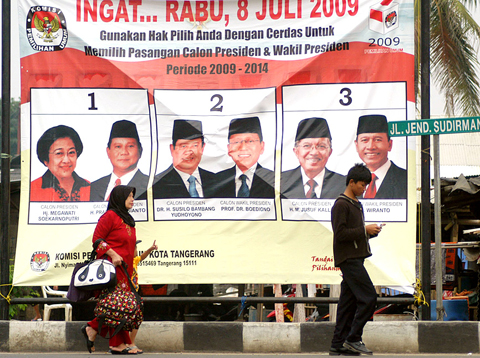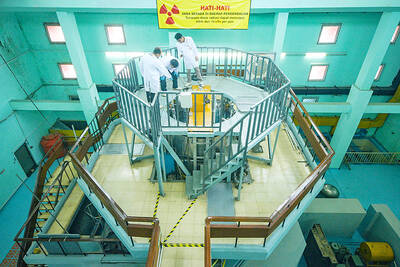Indonesian President Susilo Bambang Yudhoyono can be forgiven for feeling smug ahead of Wednesday’s presidential polls — he is overseeing one of the best performing economies in the G20 amid a global crisis.
The liberal ex-general has a huge lead over his main rival, former president Megawati Sukarnoputri, and is hoping to avoid a September runoff by winning a clear majority in the first round of elections.
Indonesia’s economy is growing at more than 4 percent and is expected to rebound to around 6 percent next year on the back of strong domestic demand and revived export sales.

PHOTO: AFP
Such numbers should make Indonesians of all political stripes pleased as Punch, especially after the mauling the economy received during the Asian financial crisis in the late 1990s, when the country virtually went bankrupt.
But not so. Almost by virtue of his administration’s economic success, the soft-spoken president known simply as SBY has come under attack as a “neo-liberal,” a free-market zealot and stooge of foreign capitalists.
His opponents have offered an alternative economic vision based on national “self reliance” and raged against the allegedly uneven exploitation of the country’s vast natural resources by foreign mining and forestry companies.
All well and good, except that no one seems to know exactly what any of the candidates are talking about when it comes to economic policy in Southeast Asia’s biggest economy.
Center for Strategic and International Studies economist Pande Raja Silalahi said attempts to paint Yudhoyono as a “neo-liberal” were no more than negative campaign tactics and populist sloganeering.
“There’s no such thing as ‘neo-liberal’ in this country. Those who rant about it don’t understand what ‘neo-liberal’ means,” he said.
Megawati’s running mate, former special forces commander Prabowo Subianto, has attacked Yudhoyono as a “neo-liberal” and jumped on the “self-reliance” bandwagon.
The third candidate in the race, Vice President Jusuf Kalla, has taken the same line, saying that if Indonesia wants to be a “big country” it has to shun outside influence and go it alone.
What that means in practice, though, is hard to fathom.
“Ideally, self reliance is possible for Indonesia but in practice it can’t work,” Silalahi said.
“There are no countries in the world that practice the economy of Robinson Crusoe. Self-reliance is a silly idea. International trade is done on the basis that nations can create better welfare for their people,” he said.
Prabowo and Kalla have not given a detailed set of proposals on how they plan to make Indonesia a self-reliant agrarian paradise.
“Don’t accept the idea that we are destined to be a poor nation forever,” Prabowo said in a recent campaign speech. “Don’t accept the verdict of the neo-liberal agents who are not honest, who are afraid to admit to themselves that they are neo-liberal.”
“As the election approaches they pretend to be nationalists but the nation’s assets are being sold one by one,” he said.
Kalla described it in even starker terms.
“Don’t let the blond-haired businessmen rule Indonesia ... we can become the masters of our own country,” he said during a televised election debate.
Yudhoyono has hardly done a better job of explaining his economic strategy, but vehemently rejects the “neo-liberal” label.
“I choose an economy of the middle-ground and will not leave everything to the market, or what you call fundamentalist capitalism or neo-liberalism,” the president said in his first campaign speech last month.
When Yudhoyono ousted Megawati in a landslide in 2004, foreign direct investment excluding oil, gas and banking was valued at US$4.57 billion. It had increased to US$10.34 billion by 2007 and US$14.87 billion last year.
Most economists believe more foreign direct investment (FDI) is needed, especially in infrastructure and energy projects.
“The rising value of FDI doesn’t mean the government is neo-liberal. Capital and labor in the globalization era are mobile and cross-border,” Standard Chartered Bank economist Fauzi Ichsan said. “Even during Megawati’s term, foreign direct investment increased,” he said. “FDI is good because it creates more job opportunities and decreases the number of poor people.”

Four people jailed in the landmark Hong Kong national security trial of "47 democrats" accused of conspiracy to commit subversion were freed today after more than four years behind bars, the second group to be released in a month. Among those freed was long-time political and LGBTQ activist Jimmy Sham (岑子杰), who also led one of Hong Kong’s largest pro-democracy groups, the Civil Human Rights Front, which disbanded in 2021. "Let me spend some time with my family," Sham said after arriving at his home in the Kowloon district of Jordan. "I don’t know how to plan ahead because, to me, it feels

Poland is set to hold a presidential runoff election today between two candidates offering starkly different visions for the country’s future. The winner would succeed Polish President Andrzej Duda, a conservative who is finishing his second and final term. The outcome would determine whether Poland embraces a nationalist populist trajectory or pivots more fully toward liberal, pro-European policies. An exit poll by Ipsos would be released when polls close today at 9pm local time, with a margin of error of plus or minus 2 percentage points. Final results are expected tomorrow. Whoever wins can be expected to either help or hinder the

North Korea has detained another official over last week’s failed launch of a warship, which damaged the naval destroyer, state media reported yesterday. Pyongyang announced “a serious accident” at Wednesday last week’s launch ceremony, which crushed sections of the bottom of the new destroyer. North Korean leader Kim Jong-un called the mishap a “criminal act caused by absolute carelessness.” Ri Hyong-son, vice department director of the Munitions Industry Department of the Party Central Committee, was summoned and detained on Sunday, the Korean Central News Agency (KCNA) reported. He was “greatly responsible for the occurrence of the serious accident,” it said. Ri is the fourth person

SKEPTICAL: Given the challenges, which include waste disposal and potential domestic opposition, experts warn that the 2032 nuclear timeline is overambitious Indonesia is hoping going nuclear can help it meet soaring energy demand while taming emissions, but faces serious challenges to its goal of a first small modular reactor by 2032. Its first experiment with nuclear energy dates to February 1965, when then-Indonesian president Sukarno inaugurated a test reactor. Sixty years later, Southeast Asia’s largest economy has three research reactors, but no nuclear power plants for electricity. Abundant reserves of polluting coal have so far met the enormous archipelago’s energy needs, but “nuclear will be necessary to constrain the rise of and eventually reduce emissions,” said Philip Andrews-Speed, a senior research fellow at the